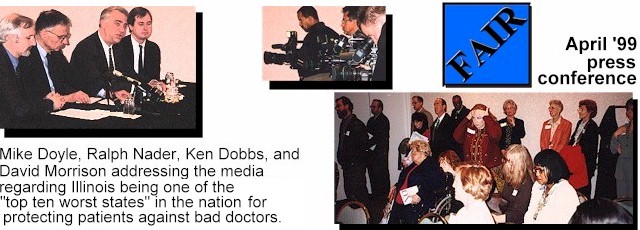

You live in the richest nation of the world, in one of the wealthiest states of the nation, and possibly in one of the richest county's of the state. You have great health insurance and pay dearly for it. You also pay state, local and federal taxes to departments (state and federal) to protect you. You expect and demand to receive good health care. In the event that you are injured or suffer medical abuse or malpractice you are protected and the doctor will be exposed and punished, right? WRONG!!!
If you live in Illinois you rate 41 out of 50. See Public Citizen's Health Research Group Ranking of State Medical Boards' Serious Disciplinary Actions in 1998. This information was discussed and reported upon by Ralph Nader and FAIR in Chicago to the public and media in April of 1999.
The Illinois Department of Professional Regulations licenses and monitors doctors who work in the state of Illinois. If you live in Illinois and are injured by an Illinois doctor this is "the" department you are suppose to notify. Ironically most of the citizens don't even know this department exists or who to call with a complaint if they've been injured.
One of the many legislative duties of the IL DPR is to investigate medical events (complaints of malpractice) and to appropriately discipline doctors. Disciplinary action may include termination of a license, revocation, suspension, probation, reprimand, and censure.
Each state has a "regulatory board" and each state handles differently how they investigate and discipline doctors. Some states operate better than others. Illinois's track record is proving that they are one state that needs "major" improvement. The issues at hand are a matter of life or death.
To put it bluntly, the IL DPR has failed in its legislative duties to investigate medical abuses and to protect the citizens of this state. They are guilty of selective enforcement and of refusing to investigate physicians. They are not protecting the citizens which they serve to protect, but are more interested in protecting the doctors which they license.
Mr. Sherman, the new director of the IL DPR, was asked by reporters who attened this press conference to comment on this report. A few weeks before this press conference , on March 23rd, Mr. Sherman met with members of FAIR and he had stressed to them and elaborated about how IL had moved up from 46th to 21st in their standing from the previous year. To him it appeared that the state was "improving". Obviously he had not yet seen the updated report.
This jump for Illinois standing from 46th in 1996 to 21st in 1997 directly corresponded with FAIR's "audit" of the DPR. This improvement may have also been a result of how the "numbers" were crunched. Regardless, after the audit the numbers improved, then they fell back into place.
Mr. Sherman was asked by FAIR about the possibility of Illinois someday being number one. His reply was that he is NOT a "statistics" person and that his goal was NOT for Illinois to be number one.
This March meeting with FAIR and Mr. Sherman came just before the house vote on the "Patients Right to Know" Bill. When this issue arose at first Mr. Sherman was not sure what the DPR's stance was on the bill, but further into the meeting he did pick up a memo that was on top of his desk as said, "Oh, the Department opposes the bill". When asked why or for an explanation (since the bill is for the protection of the citizens of the state) he declined to answer stating he didn't know why.
Other inferences were made that the DPR primary focus was NOT consumer protection, and at one point Mr. Sherman compared letting doctors go with their first serious offense (which would mean injury or gross neglience occured) with letting drivers go or get "off the hook" after their first DUI. Before being appointed as Director of the IL DPR Mr Sherman was in charge of the Department of Administrative Hearings which conducts the majority of hearings under the jurisdiction of the Secretary of State (SOS). The primary focus of the Department of Adminstrative Hearings is to decide whether DUI offenders are low risks to repeat the offense if granted driver privileges.
FAIR was also told by Mr. Sherman at this March meeting that the Department had changed the way the numbers were being analyzed (so the numbers would look better for the ratings).
So what was Mr. Sherman's response upon learning of Illinois true rating? He stated to a reporter that the backlog of cases have been "cleared". FAIR assumes what he really meant was that the cases were not really "cleared" but "closed with out an investigation" in order to catch up with their ever increasing workload.
How does your state stack up? See the Summary of 1998 Board Actions as reported by the FSMB (Federation of State Medical Boards of the United States, Inc.)